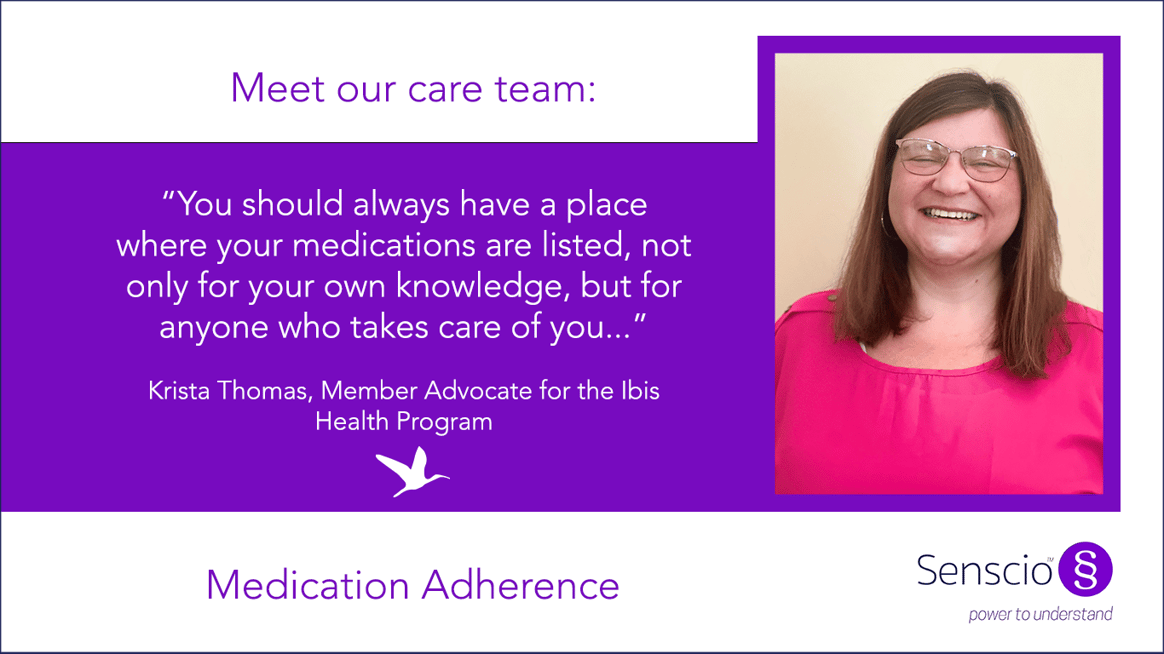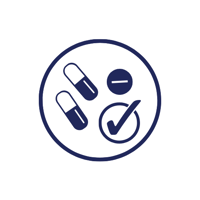Spotlight on Medication Adherence, with Krista T.

As treatments continue to advance and health care becomes increasingly targeted and personalized, those with complex chronic disease have the ability to live longer and better than ever before.
But these treatments only work if individuals actually use them.
Roughly two-thirds of Americans are prescribed at least one medication, and for patients with chronic conditions, that number can be dramatically higher. Research from the National Institutes of Health suggests as much as 40 to 50 percent of patients who are prescribed medications for the management of chronic conditions such as diabetes or hypertension don’t take them — or use them incorrectly — leading to at least 100,000 preventable deaths and $100 billion in preventable health care costs each year, according to research from the National Institutes of Health.
 That’s why improving medication adherence is one of the Six Pillars of Care that guides Ibis Health, a groundbreaking chronic care management program from Senscio Systems that combines AI-powered round-the-clock virtual care with clinical team support to empower its members to take control of their health and live life on their own terms.
That’s why improving medication adherence is one of the Six Pillars of Care that guides Ibis Health, a groundbreaking chronic care management program from Senscio Systems that combines AI-powered round-the-clock virtual care with clinical team support to empower its members to take control of their health and live life on their own terms.
Krista Thomas is a certified medical assistant and a member advocate for the Ibis Health program who oversees efforts to improve medication adherence among the program’s members. Those efforts include daily reminders delivered through Ibis Health’s proprietary AI platform and monthly reviews by the Ibis Health clinical support team to make sure the medications members are taking aligns with what their medical providers have prescribed. Clinicians also support members who may have trouble obtaining their medications and help manage side effects or potential interactions.
Thomas came to Senscio Systems after spending years working in various health care settings, from hospitals to nursing homes and primary care to in-home care.
“I wanted something where I felt like I was helping people,” Thomas said. But she found that increasingly harder to do in traditional health care settings where appointments are often doled out in 15-minute increments. “A lot of times people just need to be heard. You can’t figure out how to help them if you don’t give them the space to be heard. [But] the doctor doesn’t have the time, the staff doesn’t have the time, to find out all the issues and help people the best.”
As a member advocate, Thomas works with Ibis Health members to figure out what their goals are for their health and how to achieve them — including helping them to access and stay on top of the medications their providers have prescribed to them.
What does your typical day look like as a member advocate for Ibis Health?“I talk to people all day long, which I absolutely love! I help you figure out what you want to do with your life and how you want to take care of yourself. It’s about empowering people — giving people back that power to control parts of their lives that they feel are out of control, even if it’s something tiny. There is something small that you can take care of and control. … My typical day, it just depends on the person as to what they need and how I help. I have some members, we do relaxation techniques. Others, we’re talking more about their blood pressures or their blood glucoses. … I have one, I call her when her neighbor [isn’t available to check in on her.] She has Alzheimer’s and forgets to take care of herself — she’ll take care of the cat first. It’s a three-minute conversation … but it’s those small little things that can help out.” One of the areas you oversee as a member of the Ibis Health clinical support team is medication adherence — encouraging individuals to take the medications they have been prescribed on time and in the correct manner. Why is this such an important issue for those with chronic disease?“If you’re not taking your meds, you can’t control the conditions that you have and your doctors don’t know how to help you. It’s extremely important — it’s the most important. … People forget and that’s a big problem. If you are told to take your inhaler twice a day, it’s to prevent you from having worse lung issues. I have some people that forget the important meds, like thyroid medications, and then are having sleep problems. If you only took your thyroid [med] three days out of seven, your thyroid is not supplemented correctly. [And] there are certain meds that need to be taken at the same time every day.”
|
What is the most common piece of health advice you find yourself saying to members?“Hydrate, hydrate, hydrate! I tell people on a regular basis: If you’re above 80, you need to hydrate. Most of the time if your blood pressure is going down, you probably haven’t hydrated enough during the day. Drink some Gatorade, drink something with electrolytes in it, increase your fluid intake. A lot of times, it’s the hydration [that makes a difference], especially with older people.”
Ibis Health members receive daily reminders to take their medications through their tablets, and the program’s clinical team regularly reviews members’ medication lists to make sure they are consistent with their medical providers’ care plans. In what other ways do you help members to stay on top of their medications?“I’m a stickler for having a medication list in someone’s home. You should always have a place where your medications are listed, not only for your own knowledge, but for anyone who takes care of you. And having a system in place: You need all your meds in one place. Once you have them in different places, you’re more likely to forget. I do try to educate them on their meds… Sometimes it’s just explaining it to people. Some people are like ‘Oh, I was supposed to take that twice a day?’ … I feel like a lot of what we do is just the education. Education and resources and empowering people to be able to get their meds easier. It’s a work in progress. … There are so many programs out there to help pay for medications, but if you don’t know about them, you can’t be a part of them.” |
To learn more about Senscio Systems and its innovative Ibis Health Program visit www.sensciosystems.com and www.ibishealth.org.
Want to receive more insightful articles like this? Sign-up for our free monthly e-newsletter:






